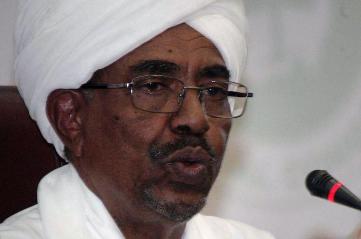Sudan’s Bashir accuses Mahdi of implementing rebels’ agendas
October 20, 2014 (KHARTOUM) – Sudanese president Omer Hassan al-Bashir has accused the leader of the National Umma Party (NUP), Sadiq al-Mahdi, of being used by the rebel alliance of the Sudan Revolutionary Forces (SRF).

However, al-Mahdi’s office issued a statement on Sunday denying press reports that Bashir rejected a request from the NUP leader to meet with him in Cairo.
Bashir said al-Mahdi made “a mistake” in the first time and we granted him a way out but he repeated the same mistake and he should bear the consequences.
The Sudanese president was alluding to remarks al-Mahdi made accusing a government militia of committing serious abuses in conflict zones.
The opposition veteran was asked by the security service to stop his criticism against the Rapid Support Forces when he did for the first time. But he was detained on 17 May when he repeated it
The Sudanese president underscored the deal between al-Mahdi and the SRF was “brokered by a Zionist mediator”, saying the SRF leaders sought to find someone who can promote their project and help them implement it.
“We had information that the SRF was looking for a national figure to help them carry out their project and they found al-Sadiq al-Mahdi,” he added.
He pointed the SRF takes arms against the state in order to seize the whole country, emphasising the SRF program is based upon a Zionist project targeting Sudan.
On 8 August, the NUP and the SRF signed the Paris Declaration after the former suspended its participation in the government-led national dialogue initiative following the arrest of al-Mahdi, who was detained for one month.
NATIONAL DIALOGUE
Bashir reiterated commitment to the national dialogue initiative he launched in January, saying some have mistakenly understood the initiative as a sign of weakness and submission.
“We noted that some [political parties] seek to jump over the dialogue and demand the outcome even before the dialogue convenes,” he said.
He added the national dialogue initiative did not mention postponement of the election or forming a national or transitional government, saying dialogue does not mean breaking the law.
In January, Bashir called on political parties and rebel groups to engage in a national dialogue to discuss ways to bring peace in the country and to discuss constitutional reforms.
Several opposition parties, including the Popular Congress Party (PCP) led by Hassan al-Turabi, the Reform Now Movement (RNM) led by Ghazi Salah al-Din Attabani and the National Umma Party (NUP), agreed to participate in the dialogue before the latter decided to suspend its participation after al-Mahdi was detained in May 2014.
The opposition alliance of the National Consensus Forces (NCF), gathering mainly leftist parties and the rebel umbrella organisation of the Sudan Revolutionary Force (SRF) refuse to engage in the dialogue citing the need to end the war, create an environment conducive for dialogue and form a transitional government.
VISIT TO EGYPT
Meanwhile, Bashir refuted media reports that the Egyptian government deliberately hung a map showing the disputed Halaib and Shalateen triangle as part of Egypt’s territory during his meeting with president, Abdel Fattah al-Sisi.
He said the map has been put since the Ittihadiya presidential palace was built; underscoring that the triangle of Halaib is part of the Sudanese territory.
Bashir stressed they will not engage in war with Egypt, saying his visit to the latter was successful and achieved its objectives.
He said he felt psychological comfort in Egypt for the first time, stressing that he sensed al-Sisi’s keenness to promote ties between the two countries.
However, he acknowledged the existence of controversial issues with Cairo, saying he agreed with al-Sisi to postpone these issues and focus on what is being agreed upon which represent 90% of the issues.
He said the remaining 10% of the issues, including Halaib, could be resolved through dialogue and legal avenues.
The Sudanese president emphasised that he agreed with al-Sisi to utilise Sudan and Egypt relations to achieve peaceful solution for the Libyan crisis, reiterating Khartoum’s fixed position not to interfere in Egypt’s internal affairs.
“Determining the identity of who should rule Egypt falls in the heart of the Egyptian people responsibilities and we are not involved in that matter,” he said.
(ST)
